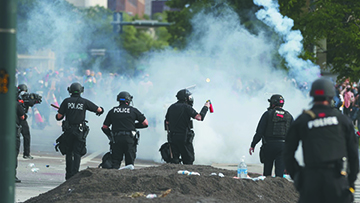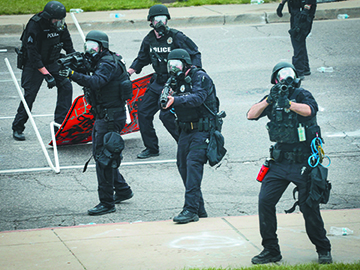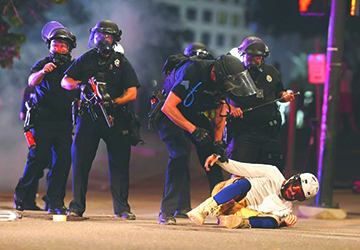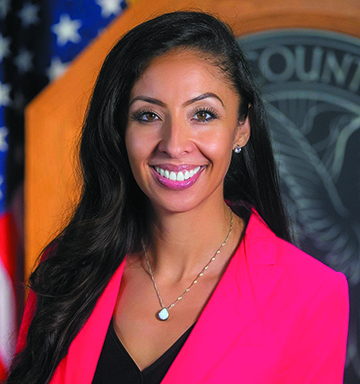“Civil service statutes establish a floor for police officer employment protections, which the unions can raise through collective bargaining.”
by Robert Davis
Imagine working in an office with 1,000 coworkers. Once every five days, you get a memo saying a coworker was accused of misconduct. One day you see a video from one incident — a coworker shooting someone in the back. You ask the coworker about it and they say the other person had a gun and they feared for their life. With those magic words, you know the shooting will be justified by the company, almost no matter what the video showed.

Anywhere else and this would be unthinkable. For the Director of Denver’s public safety department Murphy Robinson and Police Chief Paul Pazen, this office is familiar. And it’s the storied history of the office that prevents police reform activists and police officers from reforming the mountain of legal protections afforded to police officers accused of misconduct.
Why? Because the city’s civil service laws were designed with a job description in mind. In turn, Denver’s police union — Denver Police Protective Association (DPPA) — learned how to coil its collective bargaining agreement around those laws to protect officer misconduct. And until this job description is reimagined, longstanding police misconduct reform seems ill-fated.
Director of Public Safety Murphy Robinson broached the topic with city council in June during a discussion on reforming DPD’s use of force policy. As a self-proclaimed student of history acknowledged that moving on from his department’s storied history is necessary to institute immediate reforms.
“We are at a place where we need to move the needle forward,” Robinson said.
His words rang hollow to protesters in attendance like Brian Hostraw, who witnessed police officers tear-gassing small children without warning, firing pepper balls and rubber bullets indiscriminately, and destroying the property of homeless individuals with impunity during the George Floyd protests.
“These are not the actions of people I trust to protect me or my family,” Hostraw said.
And there are plenty of police officers who side with Hostraw. Chief Pazen told lawmakers that a majority of his officers agree with the increased scrutiny placed on them by SB217.
But, the one reform activists are demanding most loudly in the wake of the George Floyd protests — easing the ability of police chiefs to fire officers for misconduct — is the most difficult policy to reform.
Denver began crafting legal protections for its police officers when the first settlements along Cherry Creek were staked out in 1858. Territorial governor John C. Moore organized the Rocky Mountain Rangers under a vigilante mandate to protect the miners from the prostitutes, gamblers, and thieves that followed them west. By the time the City & County was chartered in 1904, police officers were influential players in state sponsored corruption, and earned legal protections because of it.
Before being elected mayor, Robert Speer was a veteran member of the Police and Fire Board, which oversaw a diverse range of city operations from peace officer certification to public censorship. As such, he knew how to use Denver’s finest to serve his political ends and was willing to do so.
During his first two terms, Denver’s finest engaged in voter suppression, rigging elections, and shakedowns of casinos, brothels, and saloons. Speer’s motivation was obviously political — his administration of tolerated vice and honest corruption relied on an invisible hand used to ward off Speer’s competitors. Over time, Speer rewarded Denver’s finest with employment protections that unions would later use to thwart cases of police misconduct.

Realizing how important Denver’s finest were to his political success, Speer created the Civil Service Commission (CSC) during his third tour in office in 1916. The commission established a costly disciplinary and disqualification review processes that often incentivizes public officials to look the other way at police misconduct rather than pursue a moral victory of terminating a rotten officer.
Stephen Rushin, assistant law professor at Loyola University — Chicago, argued in his 2017 article in Duke Law Journal that police union contracts use civil service laws like a double-edge sword. First, they “establish a floor for police officer employment protections, which police unions can raise through collective bargaining.” Second, they tilt the political scales in favor of the unions during negotiations.
Employment protections are established through case law, which often results in costly legal bills for the city. In Denver, city representatives must present their entire case to officers accused of misconduct before the officer decides whether to fight it in arbitration. If arbitration returns an unfavorable result, the case is appealed through the courts, where it hopes to find a judge who will accept an assertion of qualified immunity.
Judge Carlton Reeves of the Southern District of Missouri described qualified immunity as “manufactured fiction” that has had a damning influence on how courts handle cases involving police officers in his decision in Jamison v. McClendon.
He cited a decision from the Fifth Circuit Court where qualified immunity was successfully asserted by corrections officers who were accused of keeping an inmate in a jail cell covered in fecal matter for a weekend before transferring the inmate to a cell in solitary confinement that didn’t have a working toilet or sink.
The Court’s reasoning? Qualified immunity can be asserted in cases where a law is not clearly established. In terms of the case from the Fifth Circuit, the court reasoned the timeframe in which the inmate was kept in unsanitary conditions was unsettled and, therefore, qualified immunity could be asserted.
Judge Reeves specifically addressed this logical quagmire in his opinion, stating “it is a fool’s errand to ask people who love debating whether something is debatable.”
University of Virginia law professor Rachel Harmon observed in her article The Problem of Policing in the Michigan Law Review that civil service laws empower frontline police officers “to challenge any internal managerial action that affects them on both substantive and procedural grounds in a formal adversarial process.”
In May, Denver paid $1 million to settle a case against two police officers who were terminated in 2013 after they lied about assaulting two club-goers in downtown four years earlier. Over the past three years, the city has coughed up over $14.5 million to settle cases involving officer misconduct, according to an investigation by The Denver Post.
Moral Hazard
Because of the cost of disciplining police officers, departments where misconduct is rampant are thus incentivized to withhold information unless an incident rises to a level warranting action. Whistleblower Brittany Iriart revealed in June that DPD, in fact, alters information on its internal misconduct reports to protect its officers before she was fired for violating the confidentiality clause of her employment contract.

Politically, Rushin says, because municipal expenditures such as court settlements can dominate local headlines, the result for lawmakers is a moral hazard. On one hand, they are tasked to upholding the law, yet rely on a third party who is prone to turning the other cheek to prosecute miscreant police officers.
“Municipal leaders may be incentivized to offer concessions on police disciplinary procedures because they are less likely to bear the costs of those concessions in the immediate future,” he wrote.
This issue is further complicated by the political activities of DPPA and its members individually. Since 2012, DPPA has donated over $200,000 to city council candidates, according to the city’s campaign finance data. Over the same time frame, more police officers reported donating to Mayor Michael Hancock than any other candidate for office.
Likewise Denver’s statewide union, Fraternal Order of Police Lodge #27, contributes to General Assembly candidates as in local District Attorneys races.
In her Iowa Law Review article titled Who Shouldn’t Prosecute the Police, law professor Kate Levine argues that a “structural conflict of interest arises when local prosecutors are given the discretion and responsibility to investigate and lead cases against the police,” because “prosecutors rely heavily on the police for their success.”
Levine acknowledges that no criminal case would exist without first contact from a police officer and officers can create and control facts by collecting evidence from the crime scene, interviewing witnesses, or through undercover work, all of which prosecutors can admit in court.
But, the relationship between prosecutor and officer doesn’t end when a case is closed.
DA’s need campaign donations to be elected to office. Then, they rely on police officer conduct to determine negotiating leverage during grand jury cases. The Department of Justice estimates approximately 90 percent of prosecutions end with a plea bargain.
“While cases of police brutality are unlikely to go completely unnoticed, issues of “testifying” by the police, as well as evidence planting, tampering, or withholding, and illegal intimidation tactics will never emerge unless another officer or a prosecutor addresses them,” Levine wrote.
Meanwhile, even though DPPA is a public-sector union, its negotiations with city council are kept confidential. This puts councilmembers at a political disadvantage by keeping them from crowd-sourcing reform ideas from their districts.
Councilmembers also cannot negotiate with union representatives. Instead, they must negotiate through an intermediary. This year it is Legislative Services Director Linda Jamison. Denverite reported that Jamison was not invited to the meetings until three weeks after they began.
Police unions also create leverage vicariously through local news reports on crime rates. Crime statistics from DPD show that violent crime and property crime were all higher in the previous five negotiation years. Last year’s annual report by the Office of the Independent Monitor confirmed officer complaints were higher in these years as well.

According to a statement by District 9 Denver City Councilperson Candi CdeBaca, the current CBA negotiations include a measure protecting police officers from furloughs as Denver faces a budget crisis caused by the coronavirus pandemic and a two-percent salary increase.
Meanwhile, other government employees covered by career service mandates may be subject to budget-required furloughs. Currently, city projections estimate it will suffer a $226 million shortfall, of which $10 million will come out of DPD’s budget.
“This contract amounts to a uniquely beneficial agreement for DPD in the midst of hundreds of excessive use of force investigations and against a background of nationwide calls for police accountability and transparency,” CdeBaca said.
Violent crime is up 11 percent this year compared to last, according to city data.
Why Reform Hasn’t Worked (Yet)
Police reform activists currently can’t decide whether they advocate for completely tearing down the Denver Police Department or reimagining the role of police officers as a community support role, and this impasse is hindering their overall goal of easing restrictions and procedures for firing police officers for misconduct.
In August, Councilperson CdeBaca introduced legislation to abolish DPD and replace it with a peacekeeping department, a policy she claimed on social media was supported by thousands of Denverites.
Mayor Hancock called the legislation “reckless and irresponsible” in a statement shortly after it was introduced.
“The Councilwoman should exercise greater transparency and public accountability before putting something of this magnitude forward for a vote again instead of springing it on the public. I firmly stand by the men and women of our Police Department and will continue to hold accountable those who step over the line when dealing with the public,” he said.
The proposal lost at the Council level with only CdeBaca supporting it.
Others taking a community-centric approach include the newest appointee to the Citizen Oversight Board (COB), which oversees the body responsible for officer investigations, forensic psychologist Dr. Apryl Alexander.
As an academic, Alexander hopes to use her background to help forge new ways of thinking about community policing that doesn’t include excessive force, but includes accountability and restorative practices.
“People are looking for change in this moment,” she told Colorado Politics.
